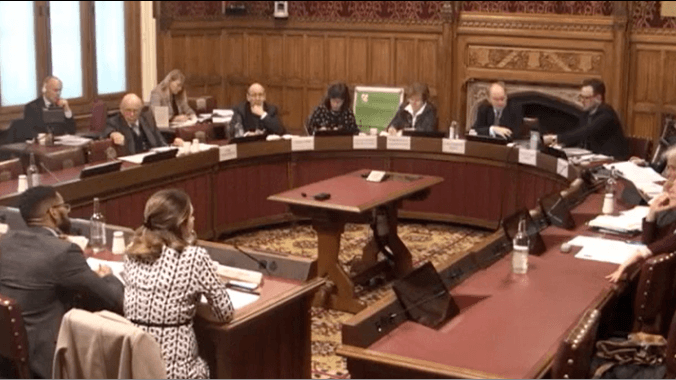Contracting stakeholders and representatives from a range of industries have called on HMRC to abandon the disastrous Off-Payroll Tax in favour of a more considered alternative during a House of Lords Finance Bill Sub-Committee hearing yesterday.
Poorly prepared businesses, uncertainty over status determinations and evidence of consequent widespread non-compliance were amongst the reasons cited by experts, who also noted that a further delay of a year would be a minimum requirement.
Insights were shared with the Finance Bill Sub-Committee hours after Rishi Sunak made his first blunder as Chancellor of the Exchequer by promising that HMRC wouldn’t be “heavy handed” during the first year of the Off-Payroll Tax, with the public still awaiting the outcome of the Treasury’s promised review of the issue.
Damning figures reveal firms aren’t ready for Off-Payroll
Poor preparation by many end-clients, insufficient education by HMRC and resulting uncertainties over the completion of compliance duties were central to many arguments for the abandonment of the Off-Payroll Tax.
Freelancer and Contractor Services Association chief executive Julia Kermode presented damning straw poll figures gathered from a 19 February 2020 HMRC webinar for businesses preparing for the Off-Payroll Tax. These found that:
- 50% of businesses are not confident in making status determinations
- 49% haven’t taken any steps to prepare for the Off-Payroll Tax
- 41% don’t know how many individuals they currently engage through an intermediary
An inevitable outcome of this uncertainty is non-compliance by firms. Andrew Chamberlain of the Association of Independent Professionals and the Self-Employed (IPSE) cited an IPSE survey to which 39% of contractors reported their clients had indicated they weren’t prepared to assess individual engagements, instead adopting a blanket approach.
‘David versus Goliath, without the slingshot’
Evidence of the resulting exploitation of contractors is already widespread, and experts noted that the Off-Payroll Tax’s client-led status disagreement process would only provide contractors with a further obstacle to securing fair tax treatment. The imbalance of power inherent in the scenario was summarised by Lord Forsyth of Drumlean, who described it as: “David versus Goliath, but without the slingshot.”
Attendees stressed the need for access to an independent arbitration service or a fast-track route to the courts, while at the same time acknowledging the practical problem of implementing such a labour-intensive process.
This was just one of many issues leading experts to agree unanimously that the Off-Payroll Tax is irredeemable. When asked about how the proposals could be improved, chief executive of the Producers Alliance for Cinema and Television John McVay OBE alluded to the intentions of the Conservative-created Office of Tax Simplification, stating: “This seems completely contrary to that. This is not simplification. This is more complexity and more burden.”
Experts challenge HMRC’s public sector proclamation
Whereas HMRC has failed to address numerous contentious issues pertaining to the Off-Payroll Tax, it has sought to justify the private sector extension through its perception of the outcome of the public sector changes. The taxman notoriously attributed a £550m spike in public sector tax yield via Pay As You Earn (PAYE) to the legislation’s introduction, an assumption that was contested by attendees.
“HMRC has stated that the public sector reforms were successful and delivered an increase in compliance by virtue of the fact that more payroll tax was taken. This doesn’t demonstrate an increase in compliance. It simply demonstrates an increase in people being put on a payroll,” noted Kermode.
“I’m not surprised that HMRC would say the reform has been very successful. They only have one metric which is the tax take,” added Independent Health Professionals’ Association (IHPA) secretary general Iain Campbell, who went on to highlight the many genuinely self-employed throughout the health sector who couldn’t achieve the requisite tax status due to blanket assessments and non-compliance by clients.
HMRC’s calculations concerning the cost of Off-Payroll compliance were also subject to scrutiny, particularly its projection that the ‘one-off impact on administrative burden’ on UK businesses would total £14.4m.
“If you take that £14.4m and split it across the roughly 60,000 engagers and 20,000 recruitment agents that HMRC expect to be impacted, that works out at £180 per entity,” observed Abigail Agopian, Principal Tax Adviser at the Confederation of British Industry (CBI).
HMRC’s implausible figure was put further into perspective by Matthew Abrahams of Oil and Gas UK, who noted that his organisation had put “thousands and thousands of man hours” into implementing compliance protocol.
Does ‘hirers tax’ offer simpler alternative?
The haste with which HMRC has sought to introduce the Off-Payroll Tax has seemingly been at the expense of Government’s Good Work Plan, which it is yet to act upon, despite repeated calls for the proposed measures to be used to inform the approach taken to IR35. Many experts called for a more holistic approach to the taxation of the self-employed where those made to work ‘inside IR35’ could at least secure the requisite employment rights.
“If the end-client has decided an engagement is one of employment, they should employ someone, and the rights and tax should be aligned,” commented Chamberlain.
Chamberlain was also amongst those posing the concept of a ‘contractor levy’ paid by hirers as an alternative to the Off-Payroll Tax, with Campbell adding: “This way, you don’t need to deal with these nuanced, difficult assessments.”
The suggestions come days after ContractorCalculator CEO Dave Chaplin outlined the idea of a ‘hirers tax’ on BBC’s Money Box. Chaplin reinforces the idea, which would apply to all contractor clients regardless of IR35 status:
“It’s pretty simple. HMRC claims that a third of contractors should be deemed ‘inside IR35’, and the combined employment tax cost of engaging an ‘inside IR35’ contractor to the hirer is roughly 14%. So instead of the undertaking the cost, administration, complexity and uncertainty of Off-Payroll compliance, why not just add a ‘hirers tax’ of 4-5% to all contract engagements?”

